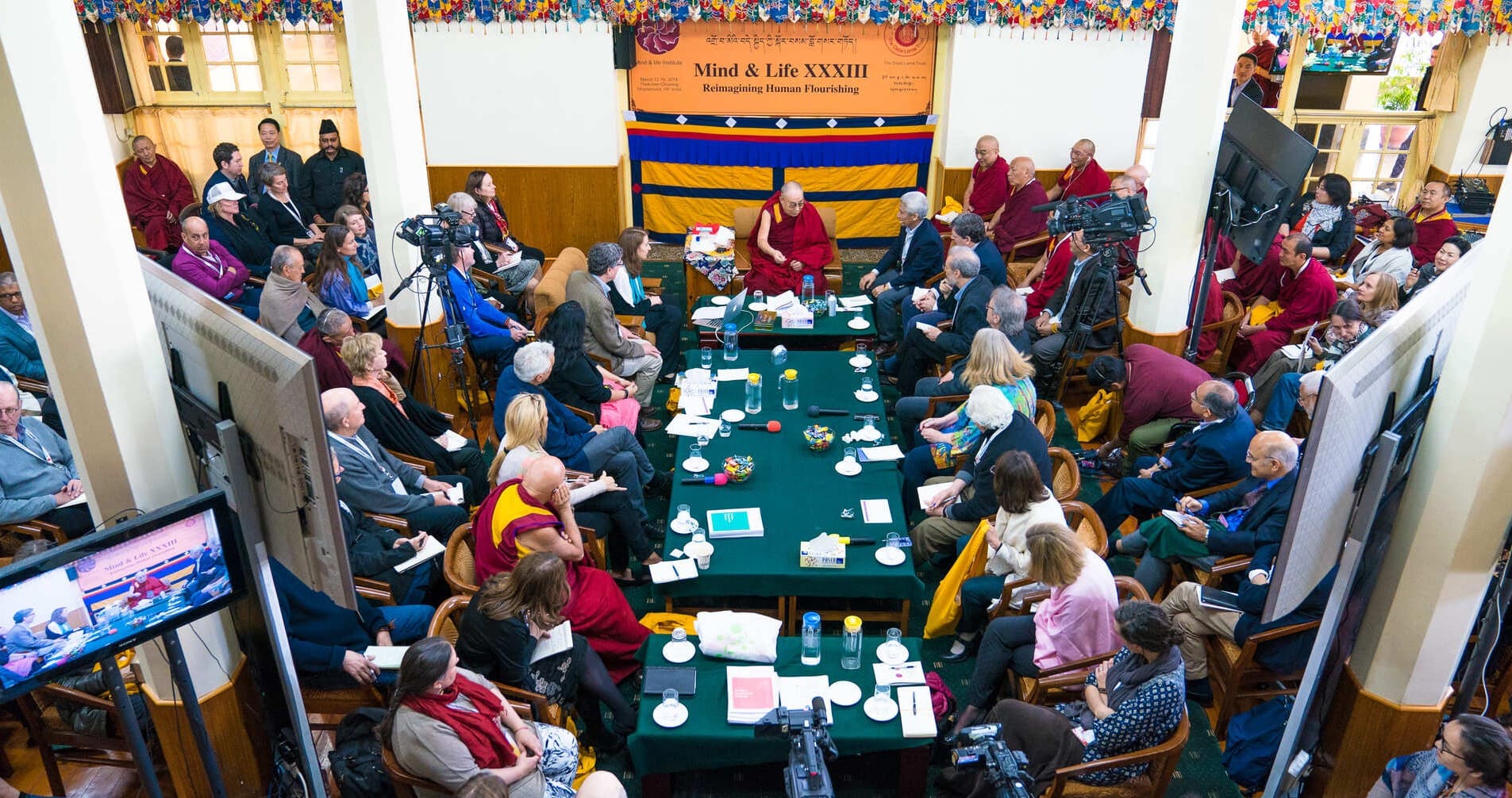
Loading...

Loading...
December 4, 2020 4:10 pm Back to Home

Since 1987 a series of dialogues between His Holiness the Dalai Lama and world’s leading scientists, philosophers and experts indifferent fields of knowledge have been organised at various locations around the world on a regular basis to critically investigate the themes of mutual interest concerning the nature of reality, consciousness, and the implications of recent developments in neuroscience, quantum physics, etc. These dialogues have brought two great investigative traditions-modern science and Buddhist teaching-together to explore and share each other’s perspectives and views on different aspects of reality.
The 33rd Mind and Life Dialogue was held at the Main Tibetan Temple, adjacent to His Holiness the Dalai Lama’s residential compound in Dharamsala, Himachal Pradesh from the 12th to the 16th of February 2018. It was organised and funded by the Dalai Lama Trust in collaboration with the Mind & Life Institute.
This year’s Mind & Life Dialogue predominantly focused on the theme of “Reimagining Human Flourishing” by highlighting His Holiness the Dalai Lama’s profound commitment towards the introduction of secular ethics in the contemporary education system.
More than 300 participants from across the world including intellectuals, sponsors, guests, scholarly monks, and nuns were invited by the Mind & Life Institute and the Dalai Lama Trust to join the five-day Mind and Life Dialogue at the Main Tibetan Temple, to observe the interesting dialogues between His Holiness the Dalai Lama and western scientists, educators and philosophers on topics such as Early Childhood Development and Social-Emotional Learning, Meta-Awareness and Attention in Education Research,
Ethics and Compassion in Education Research, etc. The Dalai Lama Trust funded all the expenses incurred on hosting, lodging, transportation, catering associated with the five-day dialogue including making badges, printing brochures, and making handbags filled with the dialogue programme for the participants and observers. The five-day dialogue was broadcast live via social network sites like Facebook and the official website of His Holiness the Dalai Lama to worldwide audiences by the Audio & Visual Team of the Office of His Holiness the Dalai Lama, which is also supported by the Dalai Lama Trust.
The Dalai Lama Trust also hosted a Tibetan cultural performance by the artists of the Tibetan Institute for Performing Arts followed by a simple dinner to all the guests of 33rd Mind & Life Dialogue which received great appreciation.
The presentations and dialogues for each day were divided into several sessions. The morning sessions were highlighted by featured presentations and dialogues between His Holiness the Dalai Lama and presenters on their respective subjects and the early afternoon session focused on a discussion amongst the main presenters which was then followed by a question & answer session with the general participants including monks and nuns.
The five-day dialogue between His Holiness the Dalai Lama and presenters with
different academic backgrounds highlighting topics that were centred around human flourishing, and it turned out to be fascinating and enlightening to all the attendees.
The purpose of the dialogue is, as His Holiness the Dalai Lama mentioned at the meeting, “to expand the scope of our knowledge and to promote warm-heartedness, and a greater sense of oneness of all human beings to tackle the crisis of emotions we witness today”.
The 33rd Mind & Life Dialogue concluded with words of thanks from Susan Bauer-Wu, President of the Mind & Life Institute, by acknowledging the full support and assistance of the Dalai Lama Trust, India, and hospitality of Namgyal Monastery throughout the dialogue. She also thanked the Mind & Life board, guests, faculty members and staff, and the generous donors and supporters who made this entire event possible. Finally, she expressed her gratitude to His Holiness the Dalai Lama for his generous time. In response, His Holiness said that he considers it his duty and is motivated by a Shantideva’s verse which reads:
“Having mounted the horse of the awakening mind
That dispels all discouragement and weariness
Who, when they know of this mind that proceeds from joy to joy,
Would ever lapse into despondency?”
Photo by Tenzin Choejor, OHHDL
PROGRAM SCHEDULE:
Day One:
Early Childhood Development and Social-Emotional Learning
Day Two:
Social and Emotional Learning and Education in Classroom
Day Three:
Meta-Awareness and Attention Training in Education Research
Day Four:
Ethics and Compassion in Education Research
Day Five:
Evaluation and Implementation: Challenges and Opportunities for Human Flourishing
SPEAKERS:
Tenzin Gyatso, His Holiness the 14th Dalai Lama
Michel Boivin, Ph. D, Canada Research Chari in Child Development
Richard Davidson, Ph. D., Director of the Center for Healthy Minds
Sona Dimidjian, Ph. D., Associate Professor in the Department of Psychology and Neuroscience at University of Colorado Boulder
Patricia Jennings, Ph. D., Associate Professor of Education at the Curry School of Education at the University of Virginia.
Amishi Jha, Ph. D., Neuroscientist and Associate Professor in the Department of Psychology at the University of Miami
Jennifer Knox, Educator and Member of the core Social, Emotional and Ethical Learning (SEE) team at Emory University
Sophie Langri, M.A., Project Manager for the Institute of Tibetan Classics and SEL consultant with the Ministry of Education Quebec for the Grandes Rencontres Project
Sonia Lupien, Founder and Director of the Centre for Studies on Human Stress
Matthieu Ricard, Ph. D., Buddhist Monk at Schechen Monastery in Kathmandu
Robert W. Roeser, Ph. D., MSW. Bennett Pierce Professor of Care, Compassion and Human Development at the College of Health and Human Development at Pennsylvania State University.